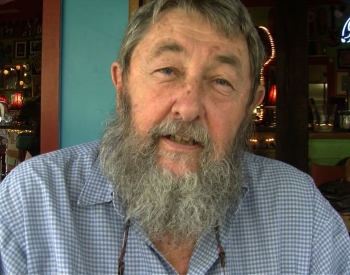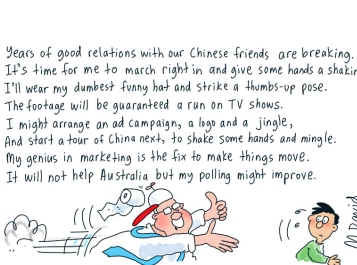The late Bob Hawke was more honest in his political views and determination to better the country than our current leaders, writes Mungo MacCallum.
BOB HAWKE'S WIDOW Blanche d’Alpuget summed it up best: his was “a life triumphantly well-lived”. The state memorial service last week sent the silver bodgie off in grand style. It was a fitting celebration of a remarkable leader.
But for some of us older observers, it was also something of an exercise in wistful nostalgia — a memory of times when politicians took on issues that were important and politics itself meant something relevant, exciting and even visionary.
When Hawke’s friend and ally Bill Kelty spoke, he mentioned Hawke’s “aspiration”, a word since debased by his successors. When Scott Morrison praises aspiration, he means personal gain, the accumulating of assets — what was once called avarice and greed.
When Hawke and Kelty used the term, they meant rising above ourselves, setting worthwhile aims for the nation – even the world – listening to our better angels. Hawke successfully opposed apartheid in South Africa and mining in Antarctica; Morrison is struggling to deliver tax cuts to his wealthy constituents.
Hawke struggled, too, but for a far more noble purpose. Paul Keating graphically described the resistance mounted against the radical agenda of economic reform the pair devised in 1983. They had to convince the cabinet, the caucus, the broad Labor movement and, finally, the general public that the changes were both necessary and desirable. And with immense effort, they succeeded. Aspiration gave way to perspiration.
The result was not a win over the 24-hour news cycle, but inspiration — not only for the present but for the future. Julia Gillard mentioned it, but the most impressive speaker was Hawke’s granddaughter, Sophie Taylor-Price, who recalled her grandfather’s call to arms on climate change in 1989 and his despair at the end of his life when, a full generation later, nothing substantial had been achieved.
She perseveres, as Hawke himself would have done if he had had more time. He was never one for the “too hard” basket, the back burner. He would have explained, persuaded, demanded an outcome — not in the crash-through or crash manner of Gough Whitlam, but with a stubborn perseverance. During one policy dispute, he famously warned the parties that they would not be allowed to leave the room without agreeing to a settlement — and he got it.
One cannot imagine any of our last six prime ministers showing such determination. Rather than aspiration, perspiration and inspiration, they have generally shown prevarication, trepidation and, more often than not, desperation.
Kim Beazley, Hawke’s friend and colleague (and arguably the best Prime Minister we never had), said of his leader that it was never just about persuasion — although Hawke could be mightily persuasive; it was about trust. Hawke did not have to constantly tell people that he was fair dinkum — they already knew it. No spin, no subterfuge, what you saw was what you got and they loved him for it..
Probably no other Prime Minister has been accepted with so much affection — certainly none since Ben Chifley. And certainly, none will get so grand a send-off. Hawke may not have been perfect, but he was pretty bloody good. And couldn’t we do with him now?
Mungo MacCallum is a veteran journalist who worked for many years in the Canberra Press Gallery. This article was published on 'Pearls and Irritations' and is republished with permission.
What was striking about the #BobHawke memorial was how much of it - from Keating, Kelty, Garnaut, Beazley - even Morrison and Hawke’s splendid grand-daughter - was about Policy. It was almost as if bold, future-directed policy was the purpose of politics. pic.twitter.com/4V6o7xYA9Z
— Hugh Riminton (@hughriminton) June 14, 2019
Support independent journalism Subscribe to IA.












